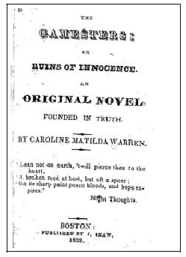Thanksgiving is one of only a few national holidays that tie Americans to their collective history. In this spirit, now is an apt time to hear the voices of those who preceded us in the field of gambling studies. In 1828, Caroline Matilda Warren published a pocket-sized volume entitled The Gamesters; or Ruins of Innocence. An Original Novel Founded in Truth. Peppering her prose with verses from Pope, Milton, and Vergil, Warren tells the tale of Leander Anderson, who squanders his family’s fortune at the gaming table before taking his own life. That The Gamesters is a didactic tract is apparent from the outset. Although the novel is wrought with moralistic judgments that may seem extreme to modern readers, some of the situations and emotions that arise will be familiar to those acquainted with the needs and experiences of contemporary problem gamblers. Anderson is referred to as ‘deluded,’ possibly indicating the author’s belief that excessive gambling involved an abnormal mental state. Guilt, shame, and social alienation are all addressed, albeit in the vocabulary of antebellum New England. We cannot know just how much of The Gamesters is based on actual persons and events. But the point may be moot. Regardless of veracity, Warren provides us with a unique historical window through which we can compare social attitudes towards gambling across centuries. Equally interesting is the rare opportunity to hear early American social history as told by a woman. Below are some selections from the text, and a facsimile of the title page:
•Cards were introduced, and Leander felt compelled to join his companions; but he did it with repugnance… His heart suffered severely from a consciousness that he had done wrong. Long and painful were the intervals between the broken slumbers of the night; alas! his conscience denied him its usual approbation. (214-15)
•He had contracted many debts, which, in the dialect of the gamester, are called debts of honor, and which the writer supposes are debts of infamy; and his affairs were in a state of embarrassment. The duties of his profession had been for some time totally neglected… (223)
•How had he fallen in his own estimation; in the estimation of his friends, in the estimation of the world. ‘A gamester!” would he exclaim; ‘who? I, Leander Anderson a gamester?’ (267)
•Already had his extravagance obliged him to pledge a considerable part of his paternal fortune; and the hope of recovering what he had so inconsiderately lost, plunged him still deeper in the abyss of ruin. On this evening fortune was awhile propitious, and it seemed to promise the deluded Anderson returning wealth… In a moment of despair he hazarded the securities of his estates, and they were lost. (247-8)
•[spoken by his wife] Leave gaming… I love you, Leander, and I pity your delusion (256-7)
Source: Warren, Caroline Matilda. The gamesters; or ruins of innocence. An original novel, founded in truth. Boston: J. Shaw, 1828.
This public education project is funded, in part, by The Andrews Foundation and the National Center for Responsible Gaming.
This fax may be copied without permission. Please cite The WAGER as the source.
For more information contact the Massachusetts Council on Compulsive Gambling, 190 High Street, Suite 5, Boston, MA 02110, U.S.





